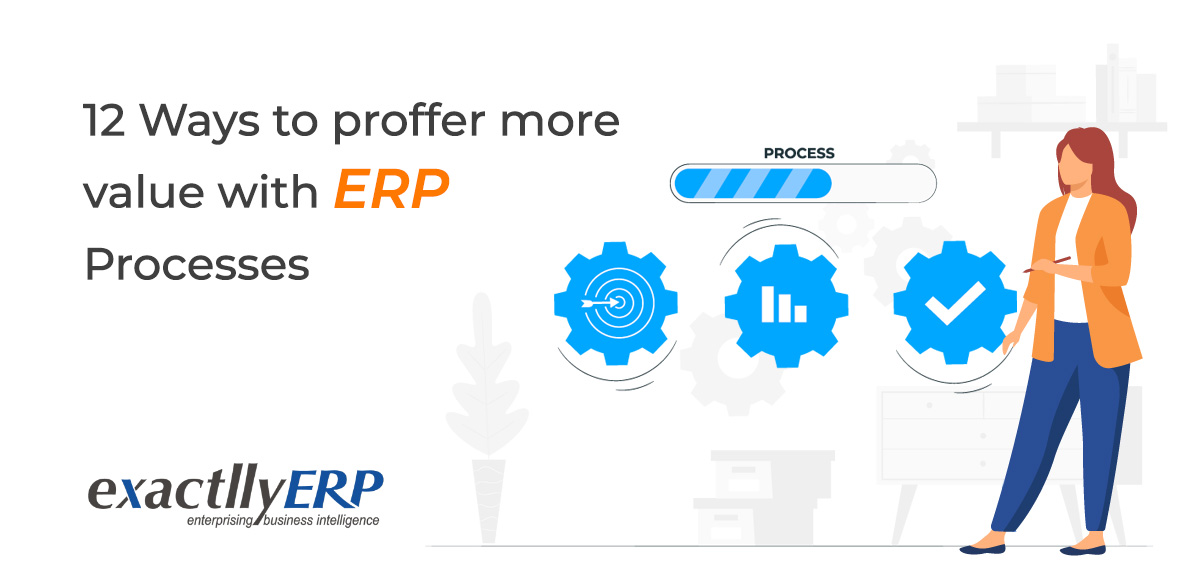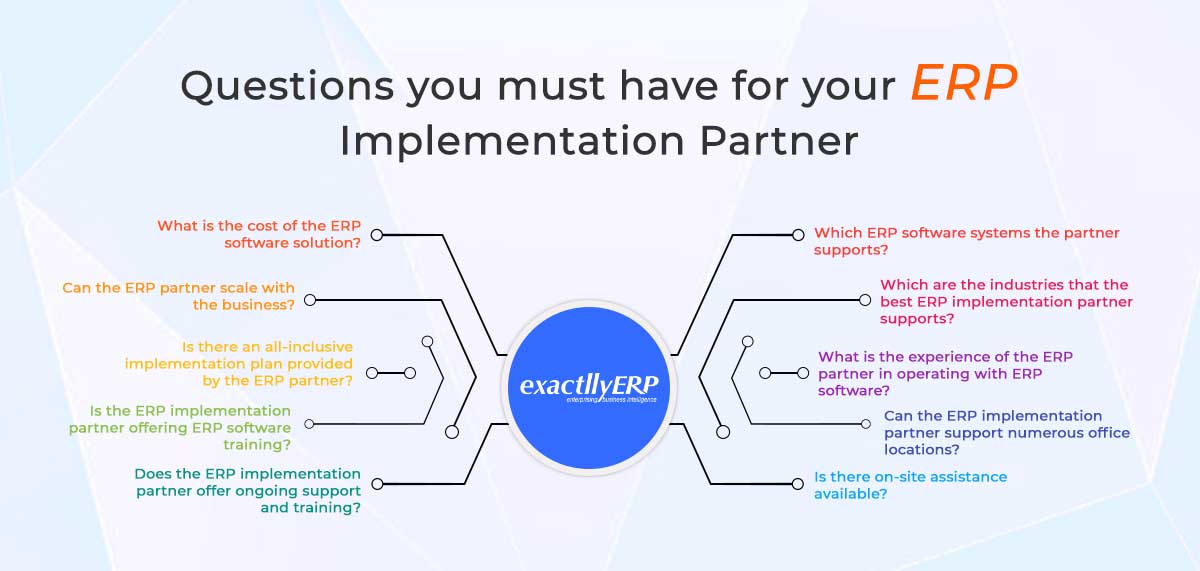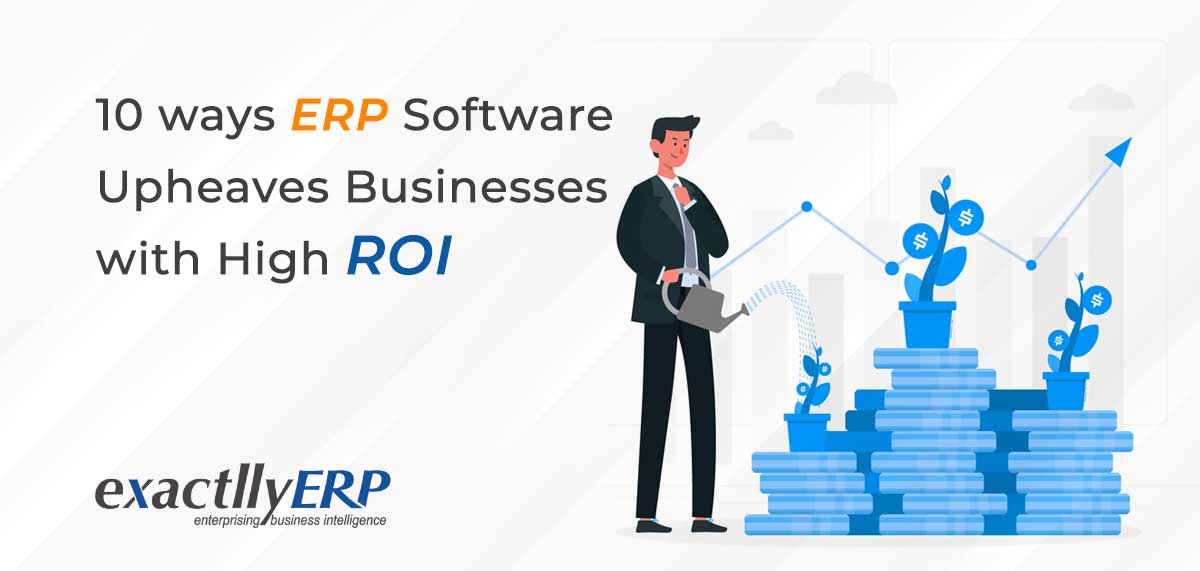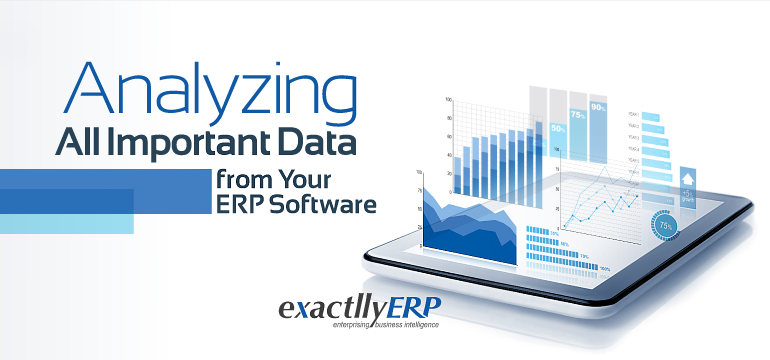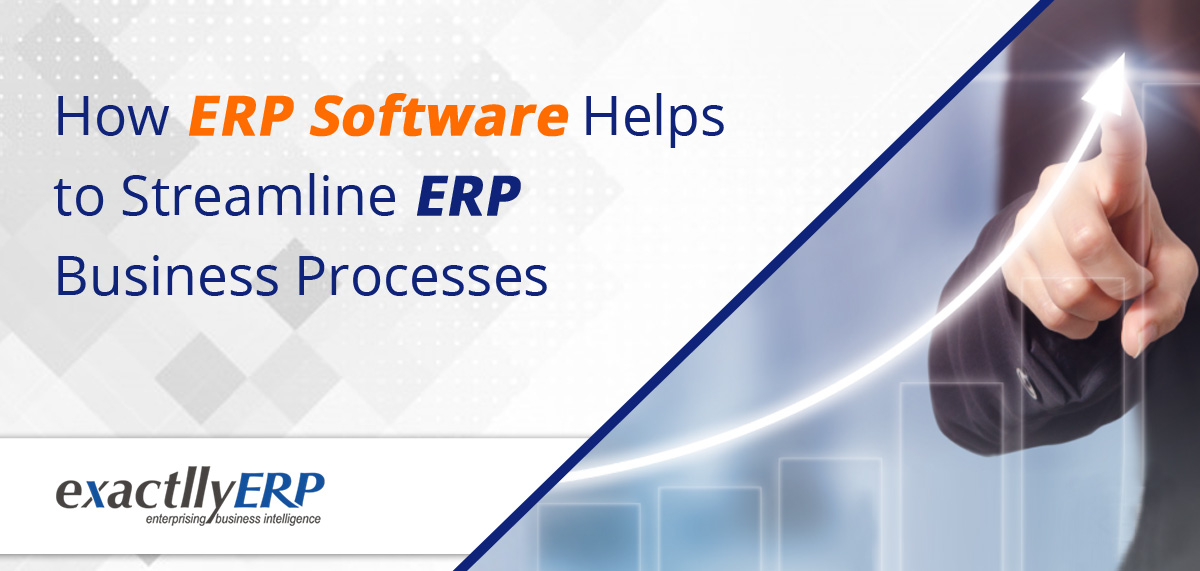5 important questions for SMEs to choose the correct ERP for SME
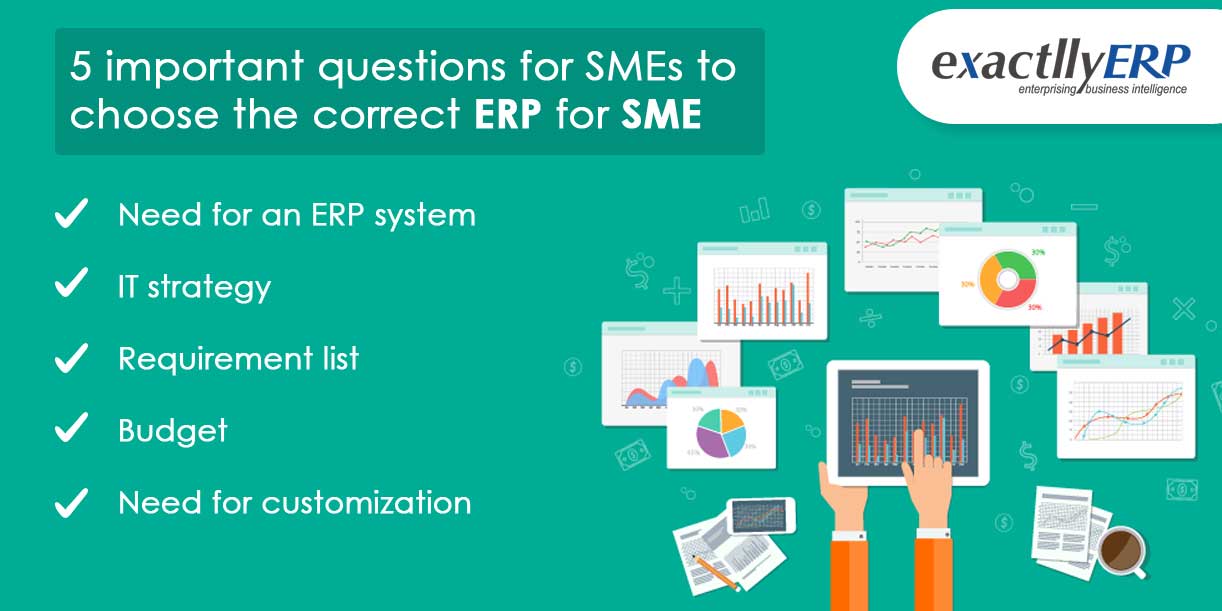
Prior to starting this blog, taking a look at all these important statistics is necessary.
The statistics are truly impressive, right?!
Gone are those days when ERP tools were meant only for large scale industries. This was mainly because of complexities associated with implementation & elevated ownership costs. But what the current era is witnessing is completely different. ERP is now empowering SME business users as well with important live information from across various operations. ERP for SME leads to businesses acting right in the present moment & also counters promptly to shifting conditions.
There is no doubt about the fact that the presence or absence of the correct resources determines the survival & disbanding of small enterprises. There is a huge influx of unsettling technologies because of globalization. If unable to harness, there is no wonder that SMEs will find it challenging to stay afloat.
Manifold organizations are currently undergoing this intermediary phase. It is extremely critical for them to alter those core businesses wherewithal which will produce enhanced revenue prospects.
So how flexible is the ERP for SME to make the shift?
The solution is Enterprise Resource Planning software. These technologies channel small businesses towards achieving success in today’s digital economy. An ERP for SME can largely benefit in terms of speedy deployment, best practices for varied business procedures incorporating production, supply chain management, financials, etc.
Also, automation of key processes takes place with ERP tools. This saves more time so that businesses can focus more on groundbreaking growth opportunities. By this, we can comprehend how ERP for SME carries the potential of solving challenges at multiple stages.
How to get hands-on the correct ERP for SME?
The first thing for selecting ERP software for SME is to know your organization’s literal requisite. Any business can adopt, execute & evolve with a system faster when it prioritizes the most critical features.
Organizations just need to know the answers to 5 very simple questions for picking the ERP software for SMEs that best suits their needs. The questions are associated with:
-
Is there a need for an ERP System –
As a company begins to grow, backing up the ongoing business processes calls for using potential ERP software for staying competitive.
The disadvantages of not using one are too many such as the inability to make real-time decisions depending on hard data, business slowly leaking profits, etc. Such companies will usually carry frustrated sales employees; upgrade restrictions due to customizations & a lot more. These companies especially require a new system for business growth.
The first part of the SME ERP solutions selection scheme is the planning phase. This includes constructing the ERP project team & project plan. In fact, there will be a need for designing business cases as well as attaining organizational alignment. This again calls for working with a team that carries wide-ranging experience for ERP for SME implementation. It can be an external or internal resource.
-
Organizational Alignment –
This is something that needs an agreement around vision & terminology.
Most people in a company are unfamiliar with the fundamentals of the ERP system for SME. This is because such software is not utilized on an ongoing basis. The fastest means to educate a team about this software is by offering them material for aptly answering their questions.
-
Business Case –
This not only helps in attaining alignment but also displays the need for a new ERP solution for SME. This holds extreme importance in the context of approaching the decision-makers for receiving the green light.
Structuring a business case called for defining how the new technology will lead to organizational goal attainment. The questions that a business case must answer are:
- Can the new ERP for SME enhance operational & employee efficiency?
- Can the new ERP system for SME discard silos & incorporate incongruent enterprise systems?
- Can the new ERP software for SME assist in realizing long-standing organizational goals & enhance the bottom line?
-
Is the IT strategy right on track?
Supporting business organizational goals calls for transforming the pain points of the present IT infrastructure. A very important portion of this strategy is the selection & implementation of sound ERP for SME software.
Deployment Strategy:
Complex businesses sometimes opt for on-premise ERP for SME systems. However, there are other factors too that play a role while building an IT strategy like:
- DRP costs
- IT support & staff skillsets
- Functionality depth
- Geo-location
- HIPPS or SOX compliance that is government regulations
Some important questions to ask your ERP vendor are:
- What is the product roadmap?
- What is the technology that the vendor is investing in? On-premise or Cloud ERP for SME?
- Is there a continuous enhancement carried out with the integration models?
Along with deployment options, taking a look at the integration strategies is also important. For instance, one approach includes implementing a sole ERP system for SME along with the needed functionality. This simple approach requires very few technical resources.
-
Creating an extensive list of requisites prior to seeking vendors –
Commencing with ERP for SME must first include defining the project scope. Emphasizing on particular system requisites & business procedures is necessary. Being specific upfront clears the path for the vendors to be more detailed in forwarding their proposals.
Getting the up-front requisites gathering procedure right is essential for the success of any project. Absent requirements can lead to project derailment in terms of timelines & budgets which is why engaging with senior management & end-users is vital.
Usually, companies choose ERP solutions for SME depending on factors such as present technology buzz & price. But if the ERP for SME system is an improper fit, then companies need to deal with pricey customization & solutions that are scrammed together. Hence, the system needs to be industry-specific along with the features & tools for meeting business requirements. A system that fits well is extensive in context to enduring benefits & ROI.
-
What is the budget?
Nothing comes for free which is true for ERP software for SME as well. Establishing a budget for the same incorporates maintenance, hardware upgrades & implementation. There are several intangible costs as well such as sluggish turnaround times as the ERP for SME is purchased online, etc. This is the space where measuring the pros & cons of cloud vs. On-premise ERP solutions can be helpful.
SMEs will find the former one to be affordable while bigger companies will go with the latter one for benefitting from its long-term savings.
Opting for a cloud-based ERP for SME also includes keeping a count of costs of subscription per user.
-
Is there a need for customization?
When it comes to configuring & deploying ERP for SME systems, the customization required is quite huge. Systems that are highly customized will automatically create higher costs not just during the primary deployment but while upgrading as well.
Businesses that carry exclusive requisites must think whether they can mainstream those requirements or not for discarding the abrupt cost curve. Also equally they must learn how much they can tolerate the elaborate implementation cycles & long ROIs. On the contrary, if the solution is a turnkey, then there might be less flexibility but less initial cost & more stability will be the winning quotient.
The basic business procedures of most businesses are all the same such as procuring supplies & paying invoices. This is the reason why ERP solutions for SME made its entry in today’s business scenario. Businesses can highly benefit from standard processes.
In case a specific business function feels the need for customization, it must first prove it. This is because the customization costs not just include writing & code testing for primary implementation but rendering long-standing support of the code. It is also important to treat every customization as an exception each time the software is upgraded.
Hence, it is best to keep it hassle-free & try not to enable customization into ERP for SME software.
The parameters will not only help SMEs locate their own requisites but also choose the correct solution.
Seeking out the following features is a must when it comes to selecting the best ERP solutions for SME.
- Need for simultaneous growth – The ERP software for SME in question must be a totally scalable solution. It must leverage the benefits put forward by a SaaS ERP. The suite must be capable of seamlessly incorporating the new subsidiaries by the organization. The integration of warehouses & offices across the world also should not be a hassle.
- Need for a partner ecosystem for the purpose of speedy deployment – Any ERP for SME a business chooses, it must receive support from an established partner ecosystem. This will help businesses to discover, purchase, develop, execute & support the solutions which suit the organization’s exclusive needs. SMEs also must look for Rapid Deployment Packages that are industry-based. But these also must attain support from partner ecosystems.
- Covers every business function & offers industry-based practices – If the chosen ERP software for SME is able to render the best industry practices, it benefits the management big time. For instance, the management can promptly engage in platform deployment, receive real-time business intelligence & analytics for full visibility.
- Accessible anywhere & anytime – This is a time when work accessibility & flexibility holds utmost significance. It is equally vital for ERP software for SME to cater to this requirement.
- Inventory management – The ERP for SME system in question must aid small businesses in tracking information on the supply of products. The sole purpose here is to maintain enough stock for avoiding unnecessary spending.
- Supply chain management – Keeping a track of goods as they move via the supply chain is important. This can easily be fulfilled with the implementation of a proper ERP system. This feature will incorporate applications like supplier management, warehouse management, supply chain planning, etc.
- Business intelligence – This feature of the ERP system facilitates businesses to assess & report applicable data. This largely aids with proper decision making.
- Reporting and analytics – With this, businesses can get hands-on accurate & all-inclusive reports across every department. This facilitates precise decision making & data analysis.
ERP types & the best ones for Small Businesses:
Till now we know the questions that SMEs must answer before choosing ERP for SME systems. Similarly, it is equally important to know the various ERP types for small businesses.
- Small business – This ERP type helps SMEs with human resources & order management. This incorporates manufacturing components as well & carries restricted ERP functions. This resource planning solution is truly an affordable one.
- Industry-specific – This SME ERP solution enables customization for meeting the requisites of particular industries like Automotive, Retail, etc. Large businesses usually utilize this solution for responding to complex needs.
- Web-based – This ERP for SME type is also regarded as the cloud-based one. It can be open-source or a vendor can host it. Businesses can benefit from the remote access this ERP system provides that can be used on any device & anywhere. The setting up of the web-based software is not so complex. The installation part is also hassle-free. All of these factors make it ideal for small businesses.
ERP – the hub of your business:
The integrated solutions that we find in this blog definitely influence the core Enterprise Resource Planning system & innovations. Not just this but the solutions power the partner ecosystem’s intellectual property as well as specialized services, configurations, industry, etc. Thus, the resulting solutions also provide speedy value time, lesser risk along high predictability at striking price points.
In fact, newer ERP solutions for SME also incorporate advanced capabilities such as predictive analytics & machine learning. This will help SMEs to capitalize on rewarding new ventures.
Do you feel the growth of your business is somewhat stagnant right now? If yes, then exactllyERP is the right solution for you. Connect with us to know more.

